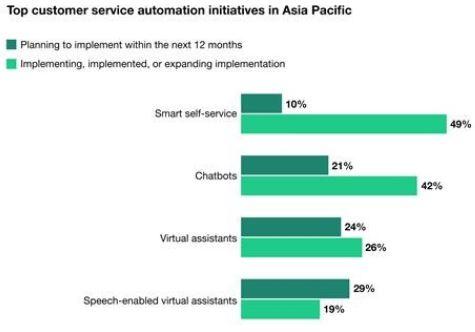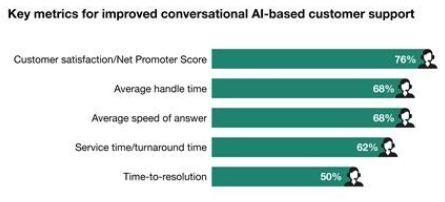



Conversational AI mostly effective but falls short in CX, finds study
share on
Chatbots are known for efficiency and in a pandemic stricken world like today, they are even more crucial to the customer journey when more businesses are turning to digital to reach a wider pool of consumers. It is also more effective in assisting consumers with their needs. That said, a recent study by Forrester, which surveyed 40 businesses across Asia Pacific showed that nearly 76% of firms believed that conversational AI improved resolution times during the pandemic.
Chatbots (32%) were the most effective in resolving customer queries quickly followed by smart self-service (28%), virtual assistants (23%), and speech-enabled virtual assistants (8%). Meanwhile, 49% said they are implementing, have implemented or are expanding the implementation of its smart self-service and 42% indicated they are doing the same for chatbots.

In the next 12 months, 29% said they plan to implement speech-enabled virtual assistants while 24% indicated interest in implementing virtual assistants. Despite these customer service automation initiatives, only 17% of firms said that automation lowered turnaround time and time-to-response, while 8% said automation improved customer satisfaction score (CSAT) and net promoter score (NPS).
CSAT and NPS were the top metrics (76%) used to measure improvement in conversational AI-based customer support. This was followed by average handle time (68%) and average speed of answer (68%).

While conversational AI fared well in efficiency, Forrester found that it did not do as well for customer experience. Majority of those surveyed (80%) said chatbots produced more negative experience than positive or neutral ones during the pandemic.
At the same time, virtual assistants (75%) and speech-enabled virtual assistants (70%) also led to poor customer experience. While smart self-service also resulted in poor customer experiences, it fared slightly better than the rest with only 66% of those surveyed indicating so.
Overall, improving digital channel experience in the next 12 to 18 months is the top priority for the companies surveyed, followed by improving customer experiences and being digital-first. According to Forrester, companies should leverage internal support teams and contact centres to test groups to predict the impact on customer experience. At the same time, brands are also recommended to build a seamless human layer to augment conversational interfaces for better customer experience, and define comprehensive metrics to measure the performance of conversational AI solutions.
Photo courtesy: 123RF
Related articles:
How inclusive and intuitive are your chatbots?
Efficient, cost-saving communication with customers using chatbots
Skyscanner on chatbots: It's taking big steps to becoming mature, but...
More than 50% of SG shoppers rely on chatbots for holiday shopping
We’re not ready for the automation of storytelling
share on
Free newsletter
Get the daily lowdown on Asia's top marketing stories.
We break down the big and messy topics of the day so you're updated on the most important developments in Asia's marketing development – for free.
subscribe now open in new window
